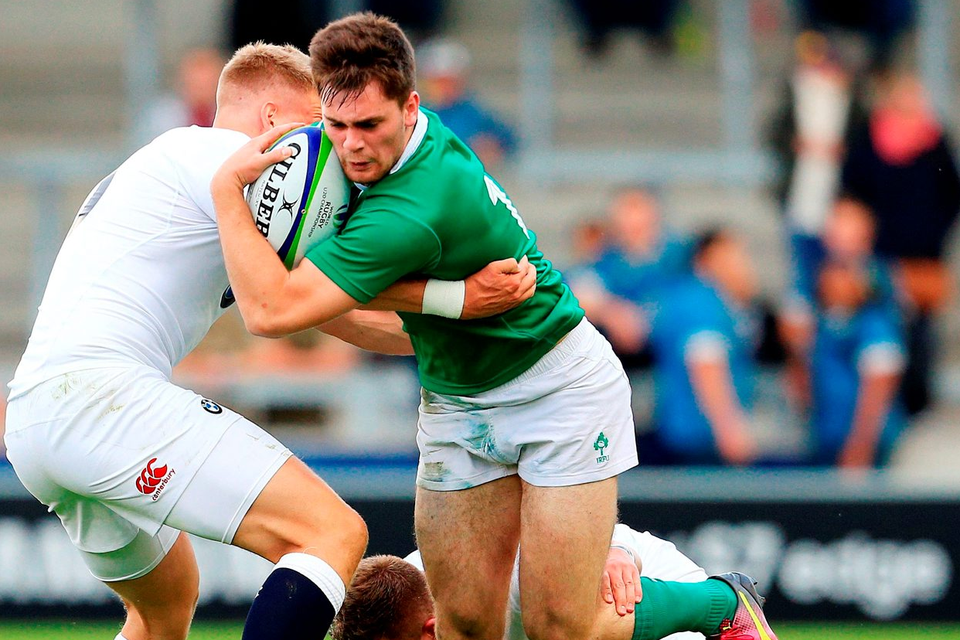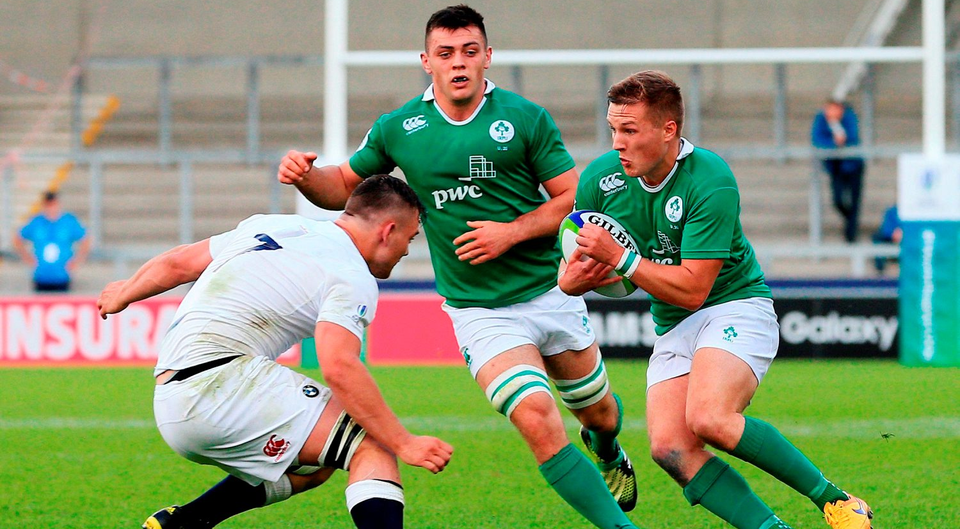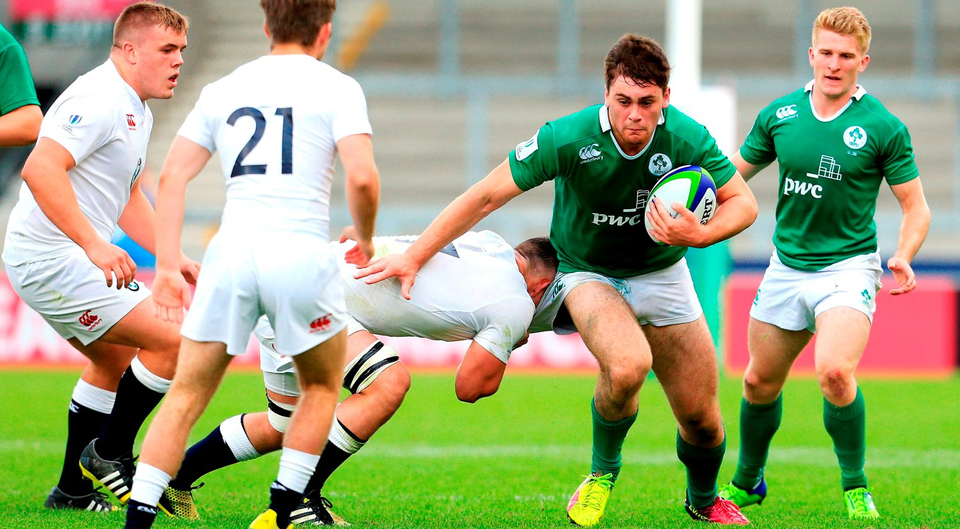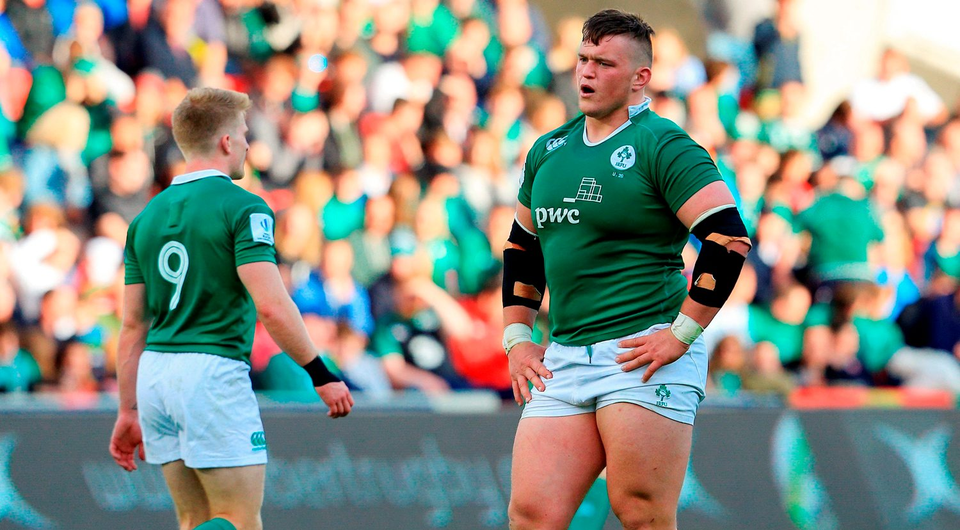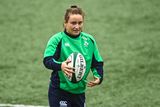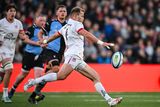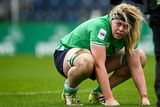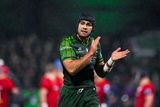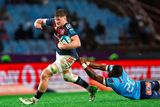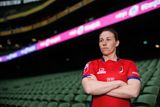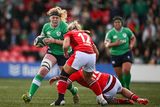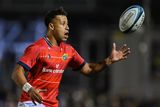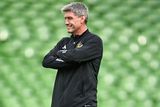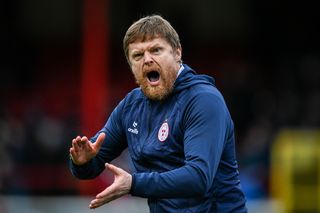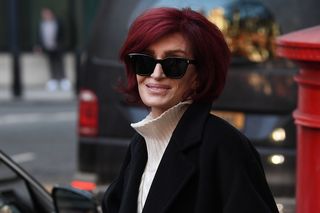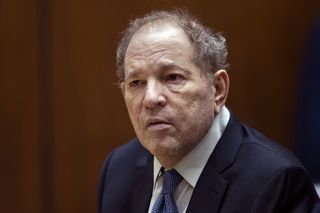English power proves too much as Carolan's men come up short
Conor O'Brien of Ireland in action. Photo by Matt McNulty/Sportsfile
The stark reality that English rugby is a step or two ahead of Ireland at this level was all too apparent in the World U-20 final where all the worst Irish fears materialised.
The start which Ireland craved and which they knew they needed to deny to the English, was achieved by the hosts who tend not to take the foot off the throat.
Johnny McPhillips of Ireland in action against Will Evans of England. Photo by Matt McNulty/Sportsfile
Ireland needed to put doubts in their minds from the outset, but you could sense that lads were reluctant to go with the strategy which had served them so well to this point.
Maybe that's the difference which comes from playing in your first final against a side appearing in their seventh in the nine-year history of the tournament, four of which were lost.
In fairness, Ireland were just not let near the ball by opponents who bossed things from the start and while it would be wrong to focus some of the blame on referee Paul Williams, it's indisputable that his call on the first scrum was crucial.
Ireland have depended on a dominant set-piece in this tournament and while they plundered plenty in the lineout on Saturday, they needed a platform from the scrum.
Conor O'Brien of Ireland in action. Photo by Matt McNulty/Sportsfile
The first put-in was going to be crucial and when Williams pinged Andrew Porter you knew it was not going to be Ireland's day.
The loosehead is 124kg and a magnificent scrummager, but his opposite number Billy Walker, eight kg lighter, popped up in the first scrum and won a penalty while Porter was still in perfect position.
It was a key moment that deflated the Irish scrum for the rest of the game, and while they disrupted a host of English lineouts, the danger was coming from all quarters.
Inevitably, it led to scores and by the interval England were 21-0 in front thanks to tries from impressive Harlequins centre Joe Marchant, Newcastle Falcons' Callum Chick and Worcester's Huw Taylor.
A dejected Andrew Porter alone with his thoughts after the World Rugby U-20 Championship final in Salford, Manchester. Photo by Matt McNulty/Sportsfile
Out-half Harry Mallinder killed off any hopes of a comeback with a brace of tries in the third quarter, although hooker Adam McBurney gave Ireland hope with his third try of the tournament off a good lineout move.
And centre Shane Daly also struck after a superb break from deep by full-back Jacob Stockdale. But Marchant got a second try before Max Deegan crossed late in the match, also for his third try of the tournament.
And there was some consolation for the No 8 and Ireland when Deegan was later announced as the U-20 World Rugby player of the year.
Coach Nigel Carolan said his charges should be proud of their efforts and that they will become better players for having performed so well in the tournament.
"Nothing needs to change, that's a fine team," he said. "Some of those English boys get exposed to a higher level a little bit earlier. The fact that whatever number of those guys in the Premiership experience of rugby at the high level of course it stands to you at this level.
"The transition isn't as big. That was telling particularly in that first half - just to try and break the physical dominance down, it's just a step too far for these guys.
"But hand on my heart I know that these guys will get bigger and stronger for it. They'll learn, particularly in their physical development in the next couple of years.
"But what they won't fear is playing Southern Hemisphere opposition or any of the other teams in the Six Nations again. Knowing that what they are doing is good and that they have the goods to beat them," said Carolan.
Heroics
He knew his men needed a foothold early in the game on Saturday evening and for all the heroics in achieving comeback wins this year, all the evidence suggested England would not relinquish a lead. And so it transpired.
"I tried to get a message on after 20 minutes that we needed to play with a lot more ambition. I thought we were playing a little bit too direct.
"And they were able to turn over a lot of ruck ball. I think in the second half when we did go to the wide channels we got a better return, but I'm not sure if that was the way to start the game. We knew we had to slow them down and we knew we needed a few little kicks.
"The kicks that we looked to make were contestable, just a couple of them were a couple of metres too far. One of them they caught and they scored. But it was the kind of game that could have been a score for either side.
"At half-time, we knew we were in a position that we have been used to, a few scores down, but against this side it was going to be really difficult to break them down and claw back 21 points."
Carolan agreed the better team won but he was disappointed that Ireland didn't show their full hand and give them a chance at winning their first crown.
"I don't think we were bullied, but physically they are a powerful side. They were very good at the breakdown, we knew they had a good scrum and a good maul.
"They are physically a hard team to break down, we knew we'd have to be really patient and we just struggled to break them down in that first 20 minutes.
"There is an interpretation in the scrum and I think with the southern hemisphere referee reffing two northern hemisphere sides, the picture can be slightly different sometimes - it can be an inter-penetration which maybe we don't necessarily agree with. We are certainly not arguing about it. The result was fair."
He said the experience of playing in a final at that level would stand to these players, so too will be other performances and notable wins in the tournament.
"We are obviously disappointed but overall there is no arguing the result. We were beaten by the better side.
"They were very clinical and any chance they got they took. At 21 points down at half-time it was always going to be an up-hill battle," said Carolan.
"We'd been in that position before, we were hoping to pull the Lazarus card and throw the kitchen sink at them.
"But I'm really proud of the fellas getting three tries back in that second half, but it was going to be a massive mountain to climb to try and get out noses in front," he added.
And so, a run of seven victories which started with a comeback win over England at Kingston Park in Newcastle in February, ended with defeat to the same opposition, albeit after the hosts made eight changes and Ireland six alterations.
But in between there were some unreal memories, not least the recovery from 17-0 down to defeat Wales in the opening match.
However, while this team didn't win the world title, they were the first Irish men's national side to defeat New Zealand. Nobody can ever take that away from them.
ENGLAND - M Malins; S Aspland-Robinson, J Marchant, J Williams, M Gallagher; H Mallinder, M Green; L Boyce, J Singleton, B Walker; S South, H Taylor; G Nott, W Evans, C Chick. Replacements: H Randall for Green (32), W Stuart for B Walker (53), A Kitchener for South (61), J Willis for Nott (61), T West for Boyce (65), C Piper for Singleton (69), O Thorley for Gallagher (72), M Wright for Aspland-Robinson (72).
IRELAND - J Stockdale (Belfast Harlequins / Ulster); M Byrne (Terenure / Leinster), S Daly (Cork Con / Munster), C O'Brien (Clontarf / Leinster), H Keenan (UCD / Leinster); J McPhillips (Queen's University / Ulster), S Kerins (Sligo / Connacht); A Porter (UCD / Leinster), A McBurney (Ballymena / Ulster), B Betts (Young Munster / Munster); S O'Connor (Cashel / Munster), J Ryan (Lansdowne / Leinster); G Jones (UCD / Leinster), D Aspil (St Mary's RFC / Leinster), M Deegan (Lansdowne / Leinster). Replacements: J O'Brien (UCD / Leinster) for C O'Brien (56), B Connon (Newcastle Falcons) for McPhillips (57), V O'Brien (Cork Con / Munster) for McBurney (61), K Brown (Shannon / Munster) for Brown (62), N Saunders (Epsom College/Exiles) for Kerins (70), E Mintern (Cork Constitution/Munster) for O'Connor (70), A Coyle (Naas/Leinster) for Betts (75), J Bollard (Dublin University / Leinster) for Porter 79).
REF - P Williams (New Zealand).
